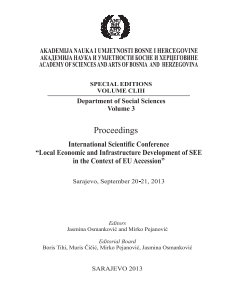OPPORTUNITIES AND RESPONSIBILITIES OF LOCAL SELF-GOVERNMENT IN ENVIRONMENTAL ASPECTS OF THE EU INTEGRATION PROCESS FOR BIH
OPPORTUNITIES AND RESPONSIBILITIES OF LOCAL SELF-GOVERNMENT IN ENVIRONMENTAL ASPECTS OF THE EU INTEGRATION PROCESS FOR BIH
Author(s): Arijana Huseinović, Tarik Kupusović
Subject(s): Politics, Energy and Environmental Studies, Governance, Environmental and Energy policy, EU-Approach / EU-Accession / EU-Development
Published by: Akademija Nauka i Umjetnosti Bosne i Hercegovine
Keywords: Environment; Local self-government; Environmental infrastructure; EU - BIH;
Summary/Abstract: The EU environmental policy does not address consequences resulting from various segments of development, but their harmonization with environment, which is a milestone of every economic, social and cultural development. The EU environmental policy has been implemented on different levels. Therefore, harmonization and implementation of legislation in BIH is an indicator of good government, as well as local self-government. Every decision, regulation and conclusion issued at any level should be characterized by short-term, midterm and long-term effects relating to the right of present and future generations to the equal use and management of limited natural resources. Although environmental policy has been identified as one of the priorities in the EU integration process, and legislation substantially harmonized with the EU legislation has been implemented in BIH, it is still insufficiently applied. The control level of implementing environmental permits and environment protection in general is relatively low. The responsible entity and cantonal (in the Federation of BIH) institutions insufficiently implement the required political, legal and institutional reforms in order to develop this framework. Neither national nor entity levels have undertaken significant steps for implementing programmes and strategies required by the signed agreements and contracts between the EU and BIH. Only few local communities show some dynamics and ability to join contemporary European trends in the environmental aspects of public utility infrastructure development and take advantage of existing opportunities that have been significantly increased after the Stabilization and Association Agreement EU – BIH has come into effect.
- Page Range: 283-300
- Page Count: 18
- Publication Year: 2013
- Language: English
- Content File-PDF

